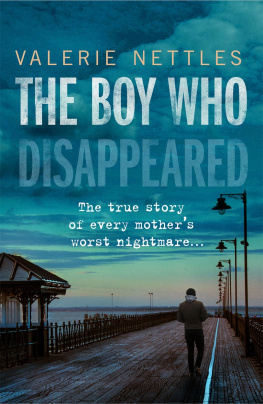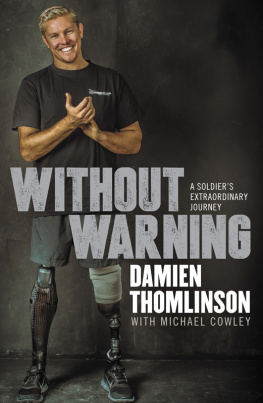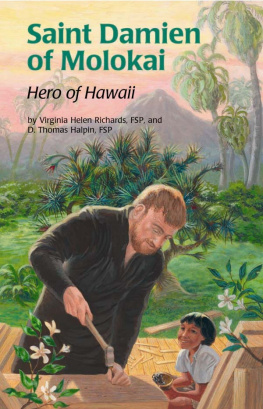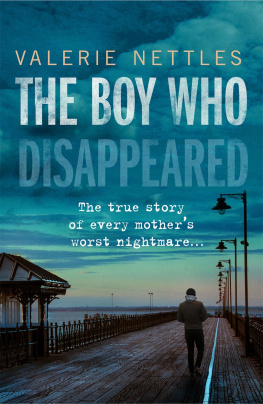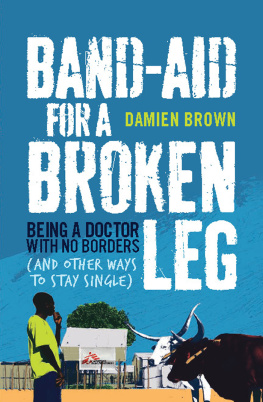Contents
Pagebreaks of the print version
THE BOY WHO DISAPPEARED
VALERIE NETTLES
THE BOY WHO DISAPPEARED
The true story of every mothers worst nightmare...

Published by John Blake Publishing,
The Plaza,
535 Kings Road,
Chelsea Harbour,
London SW10 0SZ
www.facebook.com/johnblakebooks 
twitter.com/jblakebooks 
This edition first published in 2019
Paperback ISBN: 978 1 78946 071 1
Ebook ISBN: 978 1 78946 093 3
All rights reserved. No part of this publication may be reproduced, stored in a retrieval system, or transmitted in any form or by any means, without the prior permission in writing of the publisher, nor be otherwise circulated in any form of binding or cover other than that in which it is published and without a similar condition including this condition being imposed on the subsequent purchaser.
British Library Cataloguing-in-Publication Data:
A catalogue record for this book is available from the British Library.
Design by www.envydesign.co.uk
Text copyright Valerie Nettles 2019
The right of Valerie Nettles to be identified as the author of this work has been asserted by her in accordance with the Copyright, Designs and Patents Act 1988.
Every reasonable effort has been made to trace copyright-holders of material reproduced in this book, but if any have been inadvertently overlooked the publishers would be glad to hear from them.
Please note some names have been changed to protect the privacy of the individuals involved.
John Blake Publishing is an imprint of Bonnier Books UK
www.bonnierbooks.co.uk
CONTENTS
BY BRONAGH MUNRO
We are stuck in limbo. We just cant go on with our lives, we just want Damien to come home.
The worst thing is not knowing where he is. Its exhausting. I dont have a marker for where my baby is. I dont have a grave and I dont have closure.
Finding his body or what is left of it would be a gift. It might not end the distress but if I could place him somewhere, instead of thinking of every awful thing that might have happened to him and wondering if he cried for us, if someone beat him, murdered him, if he knew what was going on, did he call for us ?
Valerie Nettles, 2015
W HEN I FIRST SPOKE TO VALERIE NETTLES, HER WORDS, SADNESS and frustration made a huge impact on me. Behind her grief, there was a determination and resilience that I immediately admired and responded to.
She was a fighter and I understood that she could not move on with her own life until she found the answers to what had happened to her son Damien. She was caught in limbo, I wanted to help her. I felt I could. But I was under no illusion at the task ahead.
On 2 November 1996, sixteen-year-old Damien had left the family home, on the Isle of Wight, headed into the small town of Cowes, for a night out, and never came back. He just disappeared.
Today, almost twenty-three years later, police still havent been able to explain what happened to Damien. They say over a thousand people have been involved in their investigation; hundreds of witness statements have been taken and thousands of documents reviewed. Yet the case remains unsolved, his body hasnt been found and no one has been charged with his murder.
In October 2015, I was part of a BBC team of four that moved to the Isle of Wight to investigate Damiens disappearance. We rented an out-of-season holiday home and spent three months working day and night on the case. In total, I worked for a year on the case.
Up to that point, the police with all their resources had been working on the case for twenty years. Other journalists, councillors, friends and private detectives had been involved with no success. There was no crime scene, no body and only circumstantial evidence to follow. The case wasnt just cold, it was frozen.
The jungle drums started beating the moment we arrived on the island, word soon spread and local residents began greeting us by name. We became a regular fixture in the town of Cowes. People were friendly. Everyone we spoke to told us a version of the story of Damien Nettles, The Boy Who Disappeared.
That was the problem, the island was awash with theories about what they believed had happened. It was difficult to decipher if peoples recollections were something they directly witnessed. Or if it was just more hearsay, an opinion based on what they had been told or what they had read in the paper, passed onto Valerie in good faith?
We were seasoned investigative journalists used to hearing all manner of accusations, used to sifting through truths and half-truths to get to the facts underneath. Id spent years working on old cases. Murders, paedophilia, allegations of police wrongdoing and informants were my stock and trade. Before that Id been a police officer for nearly ten years.
But in Damiens case, even I found it was no easy task to sort fact from fiction. The lack of physical evidence and the absence of a crime scene was always a difficult starting point. How Valerie has dealt with it all, I will never know.
We were prepared to explore all avenues but we wanted hard evidence, we wanted to prove or disprove the many stories Valerie had been told. Nothing was off the table.
It has always been important to view Damiens disappearance in the context of the time it happened. It was 1996, there were virtually no mobile phones and the internet as we know it was only emerging. You planned your nights out in person and communicated via landlines. Social media as we know it didnt exist. In todays world we would have started by examining anything and everything to do with Damien and his familys digital footprint. We would have searched his phone history, combed his social media accounts, pored over photos, text messages and email accounts, looking for any piece of evidence no matter how small Who was he? What were his interests? Who had he spent time with that night or the weeks prior to his disappearance? gathering details to stitch together into a detailed tapestry of Damiens life.
But we didnt have that in this case. The police investigation would not have been able to rely on any of this information either. It was a different time.
From the outset we were keen to meet with the police, to work with them. Disappointingly they chose not to engage with us or share any information that might have helped.
So all we had to go on was news reports from the time, and thousands of uncategorised emails that had passed between the Nettles family, police, and witnesses over the past two decades. Valeries emails became an unofficial chronology of everything that has happened in relation to Damiens case.
I spoke to many locals, business owners, and friends of the family, as well as anyone who had been spoken to by the police; all remember the family searching for Damien after he went missing. Many who spoke to me told me that they felt that the police hadnt done enough. They felt the police investigation had been too narrow in its scope in the early days. Looking back I share Valeries frustration, as that was the time when peoples memories were freshest and most evidence could have been gathered. Some told us they believed the initial investigation by the police was only in one direction.

